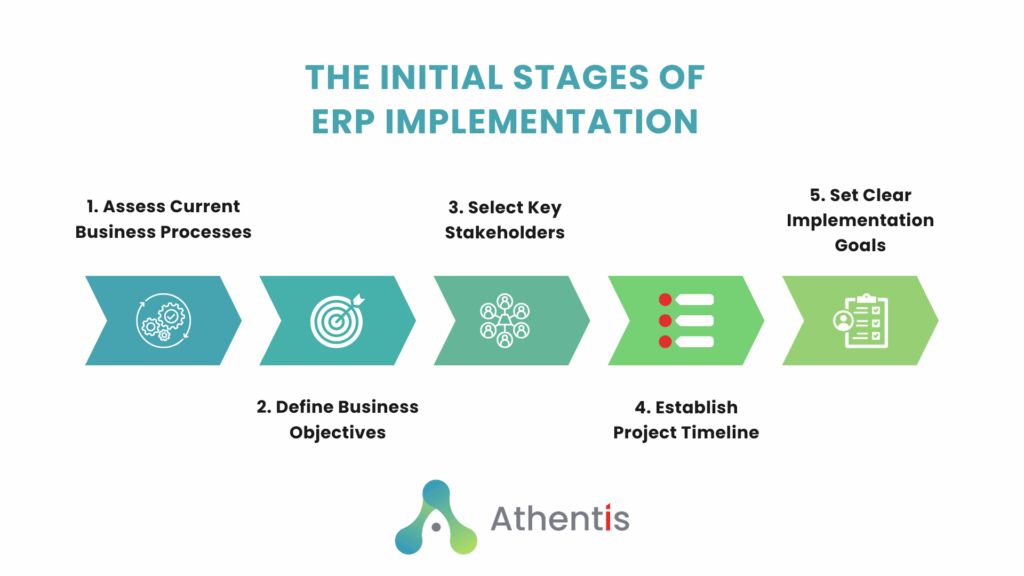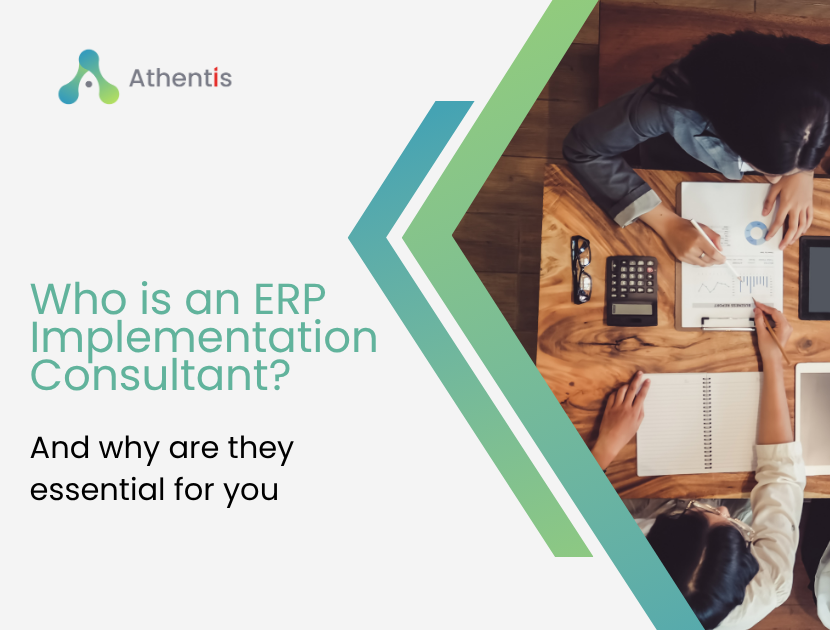IImplementing an ERP system is a significant undertaking for any business, and it’s essential to get it right. Without proper guidance, many organizations face challenges such as misalignment with business goals, cost overruns, and delays in system adoption. The role of an ERP Implementation Consultant is to navigate these obstacles, ensuring that the implementation process is smooth, efficient, and aligned with your company’s needs.
In this blog post, we’ll explore the essential role of an ERP Implementation Consultant and how their expertise ensures a smooth, efficient, and successful ERP system implementation. From managing risks to aligning your ERP system with your business needs, an ERP consultant is key to unlocking the full potential of your system.
After reading, you’ll understand the essential role of the right ERP consulting when it comes to mitigating risks, optimizing business processes, and ensuring your ERP system meets your company’s unique needs.
Let’s start!
Understanding the Role of an ERP Implementation Consultant
An ERP Implementation Consultant is a professional who plays a critical role in the successful deployment of Enterprise Resource Planning (ERP) systems. Their job involves ensuring that businesses select, implement, and optimize ERP solutions to align with their operational goals. With the right expertise, an ERP consultant can transform an organization’s business processes, improve data management, and enhance overall efficiency.
An ERP Implementation Consultant is involved in every phase of the ERP implementation process, from selecting the right system to post-implementation support. Here are the key responsibilities and duties they undertake to ensure a smooth transition:
- Business Needs Analysis: Assess the company’s unique needs and recommend ERP systems that best fit its objectives and operations.
- System Customization: Tailor the ERP system to the business’s workflows, ensuring the software aligns with specific industry requirements and goals.
- Project Management: Oversee the entire ERP implementation process, ensuring deadlines, budgets, and project scope are met.
- Data Migration: Facilitate the migration of legacy data into the new ERP system, ensuring data integrity and minimal disruption to business operations.
- Integration with Existing Systems: Ensure the new ERP integrates seamlessly with other tools and platforms within the business environment.
- User Training: Provide training for employees to ensure they are comfortable using the new ERP system and fully understand its features.
- Post-Implementation Support: Offer continued support after the system is live, helping to resolve any issues and optimize the system’s performance over time.
In handling these responsibilities, an ERP implementation consultant helps businesses and organizations navigate the complexities of system deployment, which minimizes the risks and ensures successful adoption.
A Consultant’s Role in Key Phases in ERP Implementation
Implementing an ERP system is a complex and critical process that requires careful planning and expert management. The ERP consultant plays a vital role in each stage, from initial planning and assessing business needs to executing the strategy and providing post-implementation support. In this section, we’ll explore the key phases of ERP implementation and how the consultant ensures each stage is executed effectively:
The Initial Stages of ERP Implementation

The process of implementing an ERP system begins with careful planning and evaluation. In this early phase, the ERP consultant partners closely with the organization to assess business processes, identify areas for improvement, and establish clear objectives. This collaborative effort ensures that the chosen ERP system aligns perfectly with the company’s needs, significantly increasing the chances of a successful implementation.
- Assess Current Business Processes: The consultant reviews existing processes to identify inefficiencies and areas that can benefit from automation.
- Define Business Objectives: Clear goals are set to ensure the ERP system aligns with the company’s long-term strategy.
- Select Key Stakeholders: Engaging the right people ensures buy-in and helps define project scope and expectations.
- Establish Project Timeline: Creating a realistic timeline with milestones helps track progress and manage expectations.
- Set Clear Implementation Goals: Defining measurable outcomes ensures that the ERP system delivers tangible results.
These initial steps set the foundation for a smooth implementation process. A well-executed early phase is critical to minimize risks and ensure the ERP system will meet both current and future business needs.
Assessing Business Needs and Requirements
In any ERP implementation, the first step is conducting a thorough needs assessment. This includes analyzing existing workflows, identifying improvement opportunities, and clearly understanding what the business expects from the ERP system. The consultant plays a key role in leading this assessment, working closely with key personnel to align the project with organizational goals.
- Conduct Workshops: The consultant facilitates workshops to gather input from different departments and key decision-makers.
- Review Business Documents: Existing reports, workflows, and records are analyzed to identify inefficiencies or gaps in the current processes.
- Map Out Industry Best Practices: The consultant compares current operations with industry standards to ensure alignment with best practices.
- Define Future Business Goals: Establishing future goals ensures that the ERP system supports long-term objectives.
- Set Project Scope and Boundaries: The consultant defines the project scope to ensure the implementation meets the business’s exact needs without scope creep.
The needs assessment phase ensures that the ERP system will meet the business’s current and future needs. By aligning the ERP solution with the organization’s goals, the consultant sets the stage for a system that drives real improvements.
Choosing the Right ERP System for Your Business
Selecting the appropriate ERP system is critical for successful implementation. With a wide variety of ERP solutions available, an experienced consultant uses their knowledge to evaluate options based on the company’s specific needs, growth potential, and budget. The consultant guides the decision-making process by assessing various solutions on functionality, cost-effectiveness, and scalability.
- Evaluate ERP Features and Functions: The consultant helps assess the core features that align with business needs, such as accounting, inventory management, and customer relationship management (CRM).
- Assess Scalability and Flexibility: Choosing an ERP system that can grow with the company ensures it continues to meet future demands.
- Consider Cost and ROI: The consultant helps evaluate the total cost of ownership and the expected return on investment (ROI).
- Check Vendor Reputation and Support: The consultant ensures the vendor has a strong track record and offers reliable customer support.
- Ensure Integration Capability: The ERP system must integrate seamlessly with existing systems, which the consultant assesses during selection.
Choosing the right ERP system is pivotal in setting the foundation for success. A carefully selected ERP system can improve business operations, reduce costs, and foster growth.
The Strategic Planning Phase
After selecting the ERP system, the next step is the strategic planning phase. This involves creating a detailed plan for the entire implementation process, covering everything from timelines and resources to communication strategies and risk management. The consultant works to ensure that the plan aligns with the company’s strategic goals and minimizes risks to the implementation.
- Develop Project Timeline: The consultant sets realistic deadlines and milestones to ensure the project stays on track.
- Identify Required Resources: A list of necessary resources, including personnel, tools, and technology, is compiled.
- Create Risk Mitigation Strategies: Potential risks are identified, and contingency plans are put in place to address any issues that arise.
- Outline Communication Plan: Clear channels of communication ensure all stakeholders are informed and involved throughout the process.
- Set Implementation Priorities: The consultant ensures that critical tasks are prioritized to achieve the most significant impact during the implementation.
The strategic planning phase is essential for a smooth ERP implementation. By laying out a detailed, realistic plan, the consultant helps ensure that the process stays on track and that all business objectives are met.
Developing a Customized Implementation Strategy
Each organization is unique, which is why a customized implementation strategy is key. The ERP consultant works closely with the client to create a plan tailored to their specific needs, outlining tasks, schedules, and project scope. This strategic approach ensures that the ERP system implementation process runs smoothly and efficiently.
- Assess Organizational Needs: A deep understanding of the organization’s requirements ensures the strategy is tailored to its specific context.
- Set Clear Goals and KPIs: The consultant defines key performance indicators (KPIs) to track success and ensure the system delivers measurable outcomes.
- Develop Task and Resource Lists: A detailed breakdown of tasks and resources ensures all project aspects are covered.
- Identify Potential Risks: The consultant identifies possible risks and creates mitigation strategies to reduce their impact.
- Communicate the Plan: A clear communication plan ensures that all stakeholders are informed and aligned on project goals.
A well-developed, customized implementation strategy ensures that the ERP system aligns with the company’s objectives. By reducing risks and optimizing resources, the consultant helps drive successful implementation and long-term benefits.
Execution and Management of ERP Implementation
The execution phase marks the start of the actual ERP system setup. The consultant takes the lead in ensuring that the ERP system is configured and deployed in line with the organization’s needs, following industry best practices. This phase requires careful coordination between the consultant, technical teams, and other stakeholders.
- Lead ERP Configuration: The consultant ensures the system is configured to meet business needs.
- Coordinate Data Migration: They oversee the process of migrating data from legacy systems to the new ERP system.
- Manage User Acceptance Testing: The consultant manages testing to ensure that the system functions as expected and meets organizational needs.
- Ensure Integration with Other Systems: The consultant ensures that the new ERP system integrates seamlessly with existing software and tools.
- Monitor System Performance: Continuous monitoring ensures the system is operating at peak efficiency and any issues are addressed promptly.
Execution and management are vital for a successful ERP implementation. The ERP consultant’s leadership and expertise ensure that the system is set up and fully integrated with the organization’s needs.
An ERP consultant’s expertise ensures that each phase is executed with precision, helping organizations navigate the complexities of implementation and ensuring long-term success. By working closely with the business, the consultant drives value through seamless integration, optimization, and continuous improvement, ultimately boosting productivity and supporting growth.
The Impact of Working with an Expert ERP Implementation Consultant
Partnering with a skilled ERP implementation consultant can have a transformative impact on a business’s efficiency and long-term growth. From the outset of the ERP journey, the consultant plays a crucial role in aligning the system with business goals, ensuring that each phase is executed with precision. By integrating various business functions into one streamlined system, consultants help organizations reduce manual processes, enhance collaboration, and improve data visibility, leading to significant productivity gains.
Final Thoughts
An expert ERP implementation consultant goes beyond the technical setup, providing organizations with real-time insights that empower data-driven decision-making.
By acting as a strategic partner, they ensure that the ERP system is not only smoothly adopted but also continuously optimized for long-term success. To implement this, focus on partnering with a qualified ERP consultant who can align the system with your business goals and guide you through the optimization process.
Learn more about how our expert ERP implementation consultants can help your business achieve smoother operations and long-term growth. Contact us today to explore how we can support your digital transformation journey.



